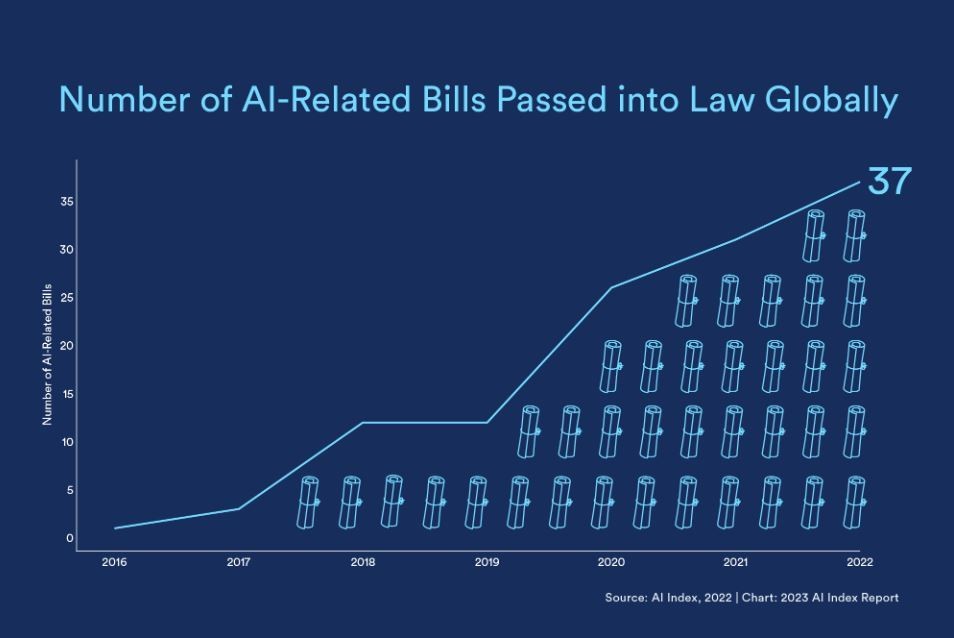Artificial Intelligence (AI) has been rapidly transforming various sectors, including but not limited to healthcare, finance, and retail. As AI increasingly permeates different business sectors, its ethical implications are becoming more complex and challenging to navigate. Businesses must be aware of the ethical considerations of AI and balance the potential benefits with the potential risks.
Navigating the ethical landscape of AI in business requires a thoughtful approach that takes into account the potential impact on society, the environment, and individuals. Ethical considerations in AI range from privacy concerns to algorithmic bias and transparency. Companies must ensure that their AI systems are transparent, accountable, and fair. They must also ensure that they are not contributing to existing social inequalities or perpetuating biases.
To navigate the ethical landscape of AI, companies must stay up-to-date with the latest developments in AI ethics and ensure that their AI systems align with their values and social responsibilities. This requires a multi-disciplinary approach that involves collaboration between business leaders, data scientists, ethicists, and other stakeholders. By taking a thoughtful approach to AI ethics, businesses can harness the benefits of AI while upholding their values and social responsibilities.
Fundamentals of AI Ethics

Defining AI Ethics
AI Ethics is a branch of ethics that deals with the moral and ethical issues related to the development, deployment, and use of artificial intelligence (AI) technologies. It involves addressing the ethical implications of AI systems, such as their impact on privacy, security, and human autonomy.
AI Ethics is a complex field that requires interdisciplinary knowledge and expertise from various fields, including computer science, philosophy, law, and social science. It involves identifying and addressing ethical issues related to the design, development, and deployment of AI systems, such as fairness, accountability, transparency, and privacy.
Key Ethical Principles
There are several key ethical principles that underpin AI Ethics, including:
- Transparency: AI systems should be transparent and explainable, so that users can understand how they work and how they make decisions.
- Fairness: AI systems should be designed to avoid bias and discrimination, and to treat all users fairly and equally.
- Accountability: AI systems should be accountable for their actions, and their developers should be responsible for ensuring that they operate in a safe and ethical manner.
- Privacy: AI systems should respect the privacy and confidentiality of users’ data, and should only collect, use, and share data in ways that are consistent with users’ expectations and preferences.
- Human Autonomy: AI systems should be designed to enhance, rather than replace, human autonomy and decision-making.
By following these ethical principles, businesses can ensure that their AI systems are developed and used in an ethical and responsible manner.
AI in Business Context

As artificial intelligence (AI) continues to permeate various sectors, its ethical implications are becoming increasingly complex and critical. In the business world, AI is transforming the way organizations operate, making them more efficient and productive. However, as AI becomes more integrated into business processes, it is essential to consider its impact on stakeholders and the ethical issues that arise.
Impact on Stakeholders
AI can have a significant impact on various stakeholders, including employees, customers, and shareholders. AI can automate tasks that were previously performed by humans, which can lead to job displacement and unemployment. This can have a significant impact on employees, especially those who lack the skills required to work with AI.
Moreover, AI can make decisions that affect customers, such as determining creditworthiness, predicting customer behavior, and recommending products. Therefore, it is crucial to ensure that AI is used ethically and does not discriminate against any group of customers.
Finally, AI can impact shareholders by affecting the financial performance of the organization. AI can help organizations make better decisions and increase profits, but it can also lead to reputational damage if used unethically.
AI in Decision-Making
AI can be used in decision-making processes, such as hiring, promotions, and performance evaluations. AI can help eliminate human biases and make more objective decisions. However, it is essential to ensure that the AI algorithms are transparent, explainable, and auditable. This will help prevent any bias or discrimination that may arise from the use of AI in decision-making.
Furthermore, AI can help organizations make better decisions by analyzing vast amounts of data and identifying patterns and trends. However, it is crucial to ensure that the data used to train AI algorithms is unbiased and representative of the population. This will help prevent any bias or discrimination that may arise from the use of AI in decision-making.
In conclusion, AI has the potential to transform the business world, but it is essential to consider its impact on stakeholders and the ethical issues that arise. By using AI ethically and transparently, organizations can reap the benefits of AI while minimizing its negative impact on stakeholders.
Regulatory Landscape

As AI adoption continues to grow across industries, regulatory frameworks are being developed to guide the ethical use of AI. Understanding the regulatory landscape is crucial for businesses to ensure compliance and avoid potential legal and reputational risks.
Global AI Policies

Source: World Economic Forum
Governments around the world are introducing policies and guidelines to regulate AI usage. For instance, the European Union (EU) has introduced the General Data Protection Regulation (GDPR) which sets guidelines for data privacy and security. In addition, the EU has developed ethical guidelines for trustworthy AI, which emphasize transparency, accountability, and fairness.
Similarly, the United States has introduced the Algorithmic Accountability Act, which requires companies to assess and mitigate the risks of algorithmic decision-making systems that may result in discrimination or other harms. The Act also requires companies to provide transparency and explainability of their AI systems.
China has also introduced guidelines for AI development, including the New Generation Artificial Intelligence Development Plan which outlines the country’s vision for AI development and sets goals for AI research, education, and commercialization.
Compliance and Enforcement
While regulations and guidelines exist, compliance and enforcement are critical for ensuring ethical AI usage. Compliance requires companies to adhere to the regulations and guidelines set forth by governments and regulatory bodies. Enforcement ensures that companies face consequences for non-compliance.
In the EU, non-compliance with GDPR can result in fines up to €20 million or 4% of a company’s global annual revenue, whichever is higher. In the United States, the Federal Trade Commission (FTC) has the power to investigate and take legal action against companies that violate consumer protection laws, including those related to AI.
In China, non-compliance with AI regulations can result in fines, the revocation of business licenses, and even criminal prosecution. Therefore, businesses must ensure compliance with regulations and guidelines to avoid legal and reputational risks.
In summary, understanding the regulatory landscape is crucial for businesses to ensure ethical AI usage. Compliance and enforcement are also important for ensuring that companies adhere to regulations and guidelines and face consequences for non-compliance.
Ethical AI Implementation

The goal of the multidisciplinary discipline of AI ethics is to guarantee that AI technologies uphold human values, prevent unjustified harm, and contribute positively to society. A wide-ranging subject, ethical AI aims to prevent negative effects like bias and discrimination while addressing privacy, justice, accountability, transparency, and human rights.
Even though it’s still early, artificial intelligence, machine learning, and large-language models (LLMs) have already had a big impact on the world! Therefore, creating moral standards that promote responsible AI governance, development, and application will be essential as these tools are further incorporated into our enterprises, technology, and daily lives.
Developing Ethical AI Strategies
Developing ethical AI strategies requires a comprehensive approach that considers the ethical implications of AI throughout the development process. Companies should start by identifying the ethical risks associated with their AI systems. They should then develop guidelines for the ethical use of AI, including the responsible collection and use of data.
Companies should also establish an AI ethics committee or designate an AI ethics advisor to oversee the ethical implementation of AI. This committee or advisor should be responsible for ensuring that AI systems comply with ethical guidelines and that AI decisions are transparent and explainable.
Tools and Best Practices
To support ethical AI implementation, companies can leverage various tools and best practices. For example, they can use explainable AI algorithms that provide clear explanations of how AI decisions are made. They can also use AI testing frameworks to identify and address ethical risks in AI systems.
Companies can also adopt best practices for data privacy and security to ensure that sensitive data is protected. They should establish clear policies for the collection and use of data, including obtaining consent from individuals when necessary.
In conclusion, ethical AI implementation is critical for ensuring that AI systems are transparent, fair, and unbiased. Companies should develop comprehensive ethical AI strategies and leverage tools and best practices to support ethical AI implementation.
Future Challenges and Considerations

Evolving Ethical Standards
As AI technology continues to evolve, ethical considerations will play a pivotal role in shaping its future. The rapid pace of development and deployment of AI systems has outpaced the development of ethical standards, creating a gap that needs to be addressed.
According to UNESCO’s Recommendation on the Ethics of Artificial Intelligence, ethical AI practices should be based on four key principles: respect for human autonomy, prevention of harm, fairness, and explicability. However, these principles are not universally adopted, and there is a need for more comprehensive and standardized ethical guidelines.
Businesses that use AI systems must keep up with evolving ethical standards to ensure that their AI practices align with these guidelines. Failure to do so could result in negative consequences, such as legal liabilities, reputational damage, and loss of customer trust.
Long-Term Business Implications
AI systems can provide significant benefits to businesses, such as increased efficiency, productivity, and accuracy. However, businesses must also consider the long-term implications of AI on their operations and the broader society.
One concern is the potential impact of AI on employment. AI systems can automate many tasks, leading to job displacement in some industries. Businesses must consider how to manage this transition and ensure that workers are not left behind.
Another consideration is the potential for AI systems to perpetuate existing biases and discrimination. AI models trained on historical data may reflect and amplify these biases, leading to discriminatory outcomes. Businesses must ensure that their AI systems are fair and unbiased, and that they do not perpetuate existing inequalities.
In conclusion, navigating the ethical landscape of AI in business requires ongoing attention and effort. Businesses must keep up with evolving ethical standards and consider the long-term implications of their AI practices. By doing so, they can ensure that their AI systems are ethical, responsible, and beneficial to both their operations and the broader society.




